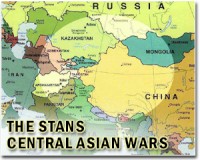 |
Peshawar, Pakistan (AFP) Oct 6, 2010 More than 40 NATO vehicles were destroyed in two separate Taliban attacks in Pakistan Wednesday as the militants stepped up their efforts to disrupt supply routes into Afghanistan. In the latest attack at least 26 NATO oil tankers were torched when militants opened fire on a convoy of dozens of vehicles parked in Nowshera in northwestern Pakistan, police said. Earlier militants attacked a depot housing 40 NATO oil tankers on the outskirts of the southwestern city of Quetta, killing a member of staff and destroying at least 18 vehicles. In Islamabad, meanwhile, the US ambassador apologised for the deaths of two Pakistani soldiers in a helicopter strike last week which led to the main border crossing into Afghanistan for NATO trucks being closed, causing more disruption to supplies. The Nowshera incident was the fifth of its kind in a week, with around 100 vehicles torched and four people killed so far. The Pakistani Taliban claimed responsibility for both of Wednesday's attacks, along with the previous raids. They vowed more attacks to disrupt NATO's supply route through Pakistan and to avenge a new wave of US drone strikes targeting Taliban and Al-Qaeda militants linked to an alleged terror plot against European cities. "We will further intensify attacks with the intensification of US drone strikes on us," Tehreek-e-Taliban spokesman Azam Tariq told AFP. Two US missile strikes Wednesday killed eight people in Pakistan's tribal northwest -- home to the alleged European plot. A security official said two missiles hit a militant compound in Miranshah, the main town in tribal North Waziristan, where foreign militants are believed to have hatched the plan to launch Mumbai-style attacks on European cities. Hours later at least three militants were killed in a drone strike on a house in Mir Ali, in the same area, security officials said. The United States has massively ramped up its drone campaign in Pakistan's lawless northwest tribal region on the Afghan border, which it calls the global headquarters of Al-Qaeda. Pakistani authorities have reported 26 attacks since September 3 which have killed around 150 people in the region, a hub for homegrown and foreign militants fighting in Afghanistan. Pakistan's ambassador in Washington, Hussein Haqqani, told the BBC that the increase in strikes in North Waziristan came after intelligence agencies uncovered the plot to "attack multiple targets in Europe". He also said that a drone strike on Monday in the district which killed eight militants, including five Germans, was linked to the plot. The Al-Qaeda plot reportedly targets Britain, France and Germany with a wave of commando-style attacks on key landmarks including Paris's Eiffel Tower and Notre Dame Cathedral and Berlin's Brandenburg Gate. French police on Tuesday arrested 12 people and seized guns in a series of anti-terror raids. The United States does not as a rule confirm drone attacks, but its military and the Central Intelligence Agency operating in Afghanistan are the only forces that deploy the pilotless aircraft in the region. The latest tanker attacks came as the main land route for NATO supplies crossing from Pakistan to Afghanistan remained closed for a seventh day running. Pakistan shut the route at Torkham in protest at a cross-border NATO helicopter attack that killed at least two Pakistani soldiers. The US ambassador to Pakistan, Anne Patterson, apologised Wednesday for their deaths, describing the incident as a "tragic accident". In Afghanistan, the US-led International Security Assistance Force said its forces had believed they were acting in self-defence and its commander, US general David Petraeus, said it would work with Pakistan "to ensure this doesn't happen again." Since the key route closed, tankers carrying fuel to the 152,000-strong NATO forces fighting the Taliban-led insurgency in Afghanistan have been attacked near the capital Islamabad, in Baluchistan and in Pakistan's south. Some 6,500 lorries are at a standstill, Khyber transport association president Shakirullah Afridi told AFP by telephone. "The problem is that American drone attacks are increasing and the Taliban are now taking revenge on us. We have no place to go," said Afridi. US air strikes in Pakistan have raised tensions between the two allies, with Islamabad condemning them as a violation of its sovereignty. The strains may be exacerbated by a White House report to Congress Wednesday which warned Pakistani forces were avoiding "direct conflict" with the Afghan Taliban and Al-Qaeda. The report said the Pakistani military had continued operations against insurgents in lawless South Waziristan, but added that soldiers stayed close to roads and that operations were progressing "slowly". It saw "bright spots," but only modest overall success, for the US surge in Afghanistan.
Share This Article With Planet Earth
Related Links News From Across The Stans
 Outside View: Is it over, over there?
Outside View: Is it over, over there?Washington (UPI) Oct 6, 2010 Just when it seemed that things could not get worse, they do. One would have thought that given the ongoing catastrophic floods, conditions in Pakistan were at a nadir. But last week, several incidents lowered even that bar regarding U.S.-Pakistani ties. NATO forces in Afghanistan made two unauthorized incursions into Pakistan, the second killing three Frontier Corps soldiers. CIA drone ... read more |
|
| The content herein, unless otherwise known to be public domain, are Copyright 1995-2010 - SpaceDaily. AFP and UPI Wire Stories are copyright Agence France-Presse and United Press International. ESA Portal Reports are copyright European Space Agency. All NASA sourced material is public domain. Additional copyrights may apply in whole or part to other bona fide parties. Advertising does not imply endorsement,agreement or approval of any opinions, statements or information provided by SpaceDaily on any Web page published or hosted by SpaceDaily. Privacy Statement |